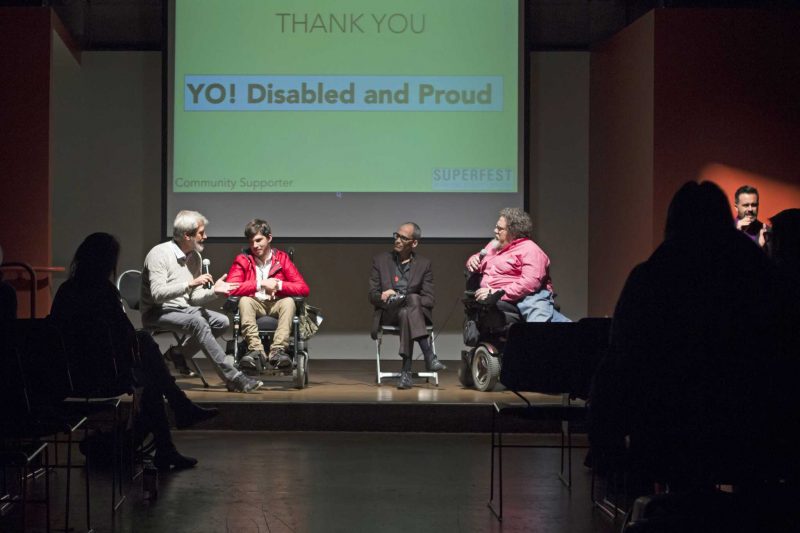Throngs of people filled the entrance of the Magnes Collection of Jewish Art and Life at UC Berkeley on Saturday to celebrate the 30th anniversary of the Superfest Disability Film Festival. The two-day festival took place at two venues, moving to the Contemporary Jewish Museum in San Francisco on Sunday.
The film festival showcased a wide range of films that hoped to change the perception of people living with disabilities in the media. The festival was fully accessible, including ASL interpreters, captions and audio descriptions for each short film, comedy show, filmmaker Q&A and award ceremony.
SF State’s Paul K. Longmore Institute on Disability helped produce the festival and has been involved with it for the past four years. The institute offers an opportunity for students with disabilities on campus to serve as jurors for the festival as part of a paid internship. For this year’s festival, the students’ job was to sort through the 119 film submissions they received.

Emily Beitiks, the assistant director of the Longmore Institute and Superfest coordinator, thinks the internship and involvement with the festival offers a great opportunity for students.
“They get to learn about disability representation and see images that look like them which is so rare to see and experience in film,” Beitikis said. “It’s an important opportunity for them to get to experience the vibrancy of the disability community that fleshes out what you’re not going to get in a textbook.”
This positive portrayal was what graduate student and Superfest juror, Alex Locust, looked for in each film.
“Superfest is an amazing opportunity to dismantle a lot of assumptions about disability, so we looked for films that shook things up or were innovative and provocative in representation of disability rather than things we see in media all the time,” Locust said. “A lot of times people with disabilities don’t get to see themselves in media, or if they do, it’s negative, toxic portrayals, so Superfest helps to show positive, complex versions of people with disabilities so that people don’t feel isolated or like they can’t be part of the conversation.”
SF State’s Institute on Disability was founded in 1996 by Paul Longmore, a professor of history at SF State, and prominent disability activist. When Longmore died unexpectedly in 2010, the University renamed the institute in his honor.
“He got everybody excited about disability studies and disability history,” said Catherine Kudlick, the director of the Longmore Institute and co-director of Superfest.
Kudlick believes Superfest is a great opportunity for the Longmore Institute to be involved with because it challenges the current stereotypes about people with disabilities.
“The media shapes our perceptions. When you change the thinking about disabilities it opens doors,” Kudlick said.
Portrayals of people with disabilities was what filmmaker Ross Turnball analyzed in his documentary “Terminal Device.” The film analyzed the perceptions of characters with prosthetic arms in popular films and pointed out how the characters are mostly vilified, such as Captain Hook in “Peter Pan.” The film was inspired by Turnball’s experience living as an amputee. He wanted to examine what he describes as the “psychology of the gaze.”
“I’m not exaggerating when I say I’m stared at every day,” Turnball said.
He agrees that accurate portrayals in the media could help change the perception of people with disabilities.
“I think it comes down to seeing the humanity in people. People with disabilities are enjoying their life as much as anyone who is fully abled,” Turnball said.
It’s this recognition of humanity that Beitiks hopes people will take away from Superfest.
“This festival shows a range of experiences and lives that are diverse and so much more real and offers people to be able to find themselves in a film and feel less alone in that moment,” she said.









Jacob Wang • Oct 27, 2016 at 1:18 pm
I’ve gone to part of the festival every year [with exceptions below] since a different organization ran it. The only years I skipped the event was when it was either at night or only focused on what’s politically incorrect